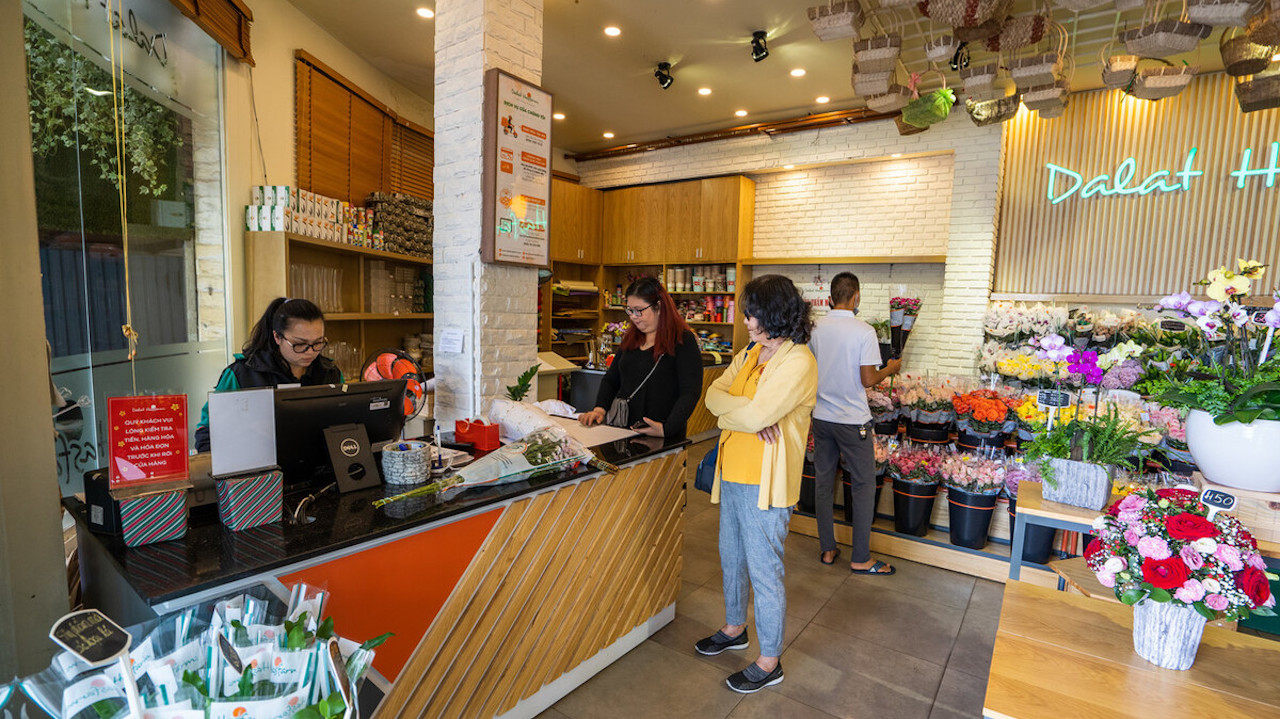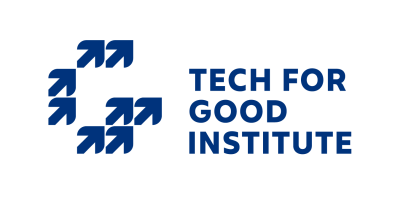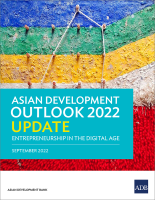Paving the Way for the Next-Generation Digital Startups

Founding Executive Director, Tech for Good Institute

Over 90% of businesses in Southeast Asia are micro, small, and medium-sized enterprises. Photo credit: ADB.
Talent, education, funding, connectedness, legal environment, and infrastructure are vital enablers for a thriving ecosystem for next-generation digital startups.
This article is published in collaboration with the Tech for Good Institute.
Over 30 years ago, the vision of ASEAN as a single market took shape. ASEAN leaders understood that free flow of goods, services, investments, capital and talent would not only strengthen competitiveness and economic development for the region as it integrated into the global economy, but also progress development goals.
Today, ASEAN is one of the fastest growing digital economies in the world. With 125,000 new users coming into the internet every day, the ASEAN digital economy is ripe with commercial opportunity. However, ASEAN is not just a market of consumers. We want to nurture a thriving ecosystem of producers, creators, traders, clients, customers, and consumers.
And as with the decades-old vision of economic integration for ASEAN, the digital economy can do more than drive economic growth. Digital technologies and the companies developing and deploying them have the potential to advance sustainable, equitable, and inclusive growth for Southeast Asia.
Startups as catalysts for fit-for-purpose solutions
Last October, the Tech for Good Institute co-organized the 8th ASEAN Economic Community Dialogue with the ASEAN Secretariat and the ASEAN Business Advisory Council on “Promoting the Growth of the Digital Startup Ecosystem in ASEAN.” At the event, ASEAN Business Advisory Council Indonesia Chair Pak Bernardino Vega highlighted the particular challenge of growing the digital economy in ASEAN: bringing fit-for-purpose solutions to meet the immediate needs of developing countries, where over 90% of companies are micro, small, and medium-sized enterprises (MSMEs). The future of our economies lies in our ability to encourage new business models while supporting the digital pivot for traditional businesses.
This challenge is also an opportunity. Technology may enable and scale solutions, but innovation requires first identifying the right problems to solve, and then fostering adoption of solutions. The latter requires trust to shift mindsets. Digital startups embedded within the markets they serve are best placed to do all of the above. They identify needs and gaps in the market, and develop context-sensitive products and services. Platform companies, in particular, recognize that supporting MSMEs benefits all. Grab, for example, previously ran the Small Business Booster Programs during the COVID-19 pandemic in 2020 across Southeast Asia to help MSMEs adopt digital solutions and expand their online visibility.
Importance of ecosystem support
Digital startups may take root within conducive local contexts, but also need regional and global connectedness to thrive. As digital economy companies often rely on scale for their business models to be viable, the six key pillars identified in the “Framework for Promoting the Growth of Digital Startups in ASEAN,” recently endorsed by the ASEAN Digital Ministers, are vital enablers for a thriving digital startup ecosystem.
- Talent. The framework highlights both the importance of local talent and mobility of talent across the region.
- Education. Technical competencies, as well as entrepreneurial skillsets, are vital to a thriving startup ecosystem. Given the pace of innovation, however, lifelong learning is just as important to ensure that the talent pool remains relevant with the right knowledge and skills.
- Funding. Digital startups require investors who understand both business and technology risk. An ecosystem of investors to shepherd startups from seed to growth provides more than capital. Their networks, experience, and expertise are equally, if not more valuable.
- Connectedness. Southeast Asia’s potential lies not in a single homogenous market, but across many small markets across member states, each requiring fit-for-purpose solutions and go-to market strategies. To foster an environment where digital economy companies can grow and scale, startups need to find like-minded partners, investors, clients, and other stakeholders across borders. Cross-border knowledge sharing and collaboration will help them access new markets and expand operations.
- Legal Environment. Policies and regulations that are aligned will encourage the startup ecosystem by fostering cross-border connectedness and building trust among stakeholders. Existing ASEAN efforts, such as the ASEAN Framework on Digital Data Governance, recognize the importance of strengthening the data ecosystem through alignment of data regulations.
- Infrastructure. The availability of both physical and digital infrastructure is critical for startups to operate efficiently. The framework extends the call for startup-friendly infrastructure by recommending that governments encourage incubators and accelerators to play enabling roles in the ecosystem.
The framework also complements the landmark Regional Comprehensive Economic Partnership (RCEP) Agreement which came into force in 2022, which seeks to boost further investments in the vibrant and growing startup scene in ASEAN by providing an expanded regional market, bolstering protection of intellectual property, and enhancing rules in services and e-commerce.
Innovation yields more innovation
We cannot underestimate the impact of having local startups dedicated to applying digital solutions to problems at home, for markets that reflect our communities. The Tech for Good Institute’s Platform Economy report found that the alumni of first-generation tech platforms such as Grab, SEA, and Ovo, have since gone on to create and lead over 1,000 startups in the region. These second-generation startups will focus on new problems, bring fresh ideas, generate new jobs, and invest in human capital to develop new offerings and services that will compete with the first-generation digital companies. As more startups scale, the ecosystem matures. This paves the way for subsequent generations of startups in Southeast Asia.
At the Tech For Good Institute, we believe that digital startups have a transformative role to play. A recent poll we conducted showed that over 70% of respondents believed that technology should be used to drive transformative impact at scale, while solving complex societal problems. Digital technology has demonstrated its ability to transform whole sectors at speed and scale. Its general enabling technologies and new business models play a key role in facilitating all other transitions we need to realize within this decade, For example, Grab, once considered as a digital startup, now provides digital financial services, helping those with no collateral develop credit risk models to allow them to secure financing from banks and other lenders. Other digital startups are underpinning completely new industries that are addressing global challenges such as climate change. Carbon markets, for example, rely on trusted and verifiable data. Companies such as Jejak.In, based in Indonesia, leverages artificial intelligence and light detection and ranging (LiDAR) sensors to monitor over 10 million trees and provide real time data for the management of carbon credits.
In his opening remarks at the 8th ASEAN Economic Community Dialogue, ASEAN Economic Community Deputy Secretary-General Satvinder Singh challenged digital startups “to solve social problems, meet the needs of people, and work toward developing sustainable solutions for the future.” The “Framework for Promoting the Growth of Digital Startups in ASEAN” will go a long way in nurturing an enabling, sustainable, and inclusive startup ecosystem that not only boosts ASEAN’s global competitiveness, but also fosters an innovation ecosystem.
This article builds on an op-ed published by ASEAN Access on 18 April 2023.

Ming Tan
Founding Executive Director, Tech for Good InstituteMing Tan is founding executive director of Tech for Good Institute, which was founded by Grab to leverage the promise of technology to advance inclusive, equitable and sustainable growth for Southeast Asia. She is concurrently a senior fellow at the Centre for Governance and Sustainability at the National University of Singapore.

Tech for Good Institute
The Tech for Good Institute is a nonprofit organization working to leverage the promise of technology and the digital economy for inclusive, equitable, and sustainable growth in Southeast Asia. The Institute is seed funded by Grab, a leading superapp in Southeast Asia.


